
Learning Outcomes
This chapter will teach you how to
- Use a mindful writing process to plan, practice, revise, and reflect on writing tasks
- Assess a writing task, set goals, generate ideas, organize, outline, draft, peer review, evaluate, revise, reflect, and make connections
- Collaborate constructively with others to engage in writing as a social process.
3.1 Mindful Writing Processes
Writing—You May Have Noticed—Is Hard
Writing is hard.
 Writing is not like riding a bike: you only have to learn to ride a bike once; learning how to write, however, is a life-long journey. #badmetaphors Photo by Michal Vrba on Unsplash
Writing is not like riding a bike: you only have to learn to ride a bike once; learning how to write, however, is a life-long journey. #badmetaphors Photo by Michal Vrba on UnsplashThe problem is that we assume it's easy. We think of writing as a remedial activity. We think of it the way we think about learning to ride a bike: Once we get the hang of it, we've got it covered forever. University students routinely try to "get out of" taking first-year writing in part because they think they've peaked as writers and there's nothing more to learn.
Nothing could be further from the truth. Learning to write is an iterative process. You get better at it as you practice, practice, practice.
But there’s another problem: Not only is writing iterative; it’s complicated. Writing is a social activity mediated by technology and the needs of writers and readers. Technology, writers, and readers are all complicated dimensions of the rhetorical situation. As you learned in the last chapter, communication is embedded in social worlds of negotiated meaning. So, writing has to respond to this situated but uncertain world.
In a very real way we're never done learning to write.
Another way we act as if writing is easy, to our detriment, is that we spend so little time on it. When get writing assignments, we put them off, procrastinating the day of our writing till the night before. Once we get words on the page and we've checked for errors, we hesitate to rethink them or revise them. So we don't.
One last way we assume writing is easy: We don't think about it at all. Writing expert Richard Lanham once said that
"Americans use their language, spoken as well as written, in a chronic absence of mind."
You could think of a number of ways this statement might be interpreted: We don't think, we don't plan, we don't strategize, we don't scrutinize, we don't reflect, we don't take language seriously. We take it for granted.
Learn to be a Mindful Writer
In this chapter, I invite you to leave these false assumptions behind, break from whatever habits you may have had in the past, and develop a mindful disposition to writing.
 Mindfulness guru Thich Nhat Hanh. Photo by Marloes on Flickr
Mindfulness guru Thich Nhat Hanh. Photo by Marloes on FlickrThe term "mindfulness" is trendy. The word might make you think of someone sitting criss-crossed on a yoga mat with a look of vague stillness on their face. Scholars who study Buddhism, like the Vietnamese monk Thich Nhat Hanh or professor of medicine Jon Kabat-Zinn, think of mindfulness as a kind of still presence — a way to be fully present in your body, detecting sensation and feeling in order to calm and redirect the mind. This kind of mindfulness is essential for mental health.
But there is another way to think of mindfulness. Mindfulness, for me, is the art of being aware of the activity you are participating in and how you might do it better. This is usually how scholars define metacognition: the process of monitoring and controlling our activity to maximize our efforts. I am suggesting here that mindfulness, as I've defined it, helps us improve our writing tasks because it directs us to monitor and control the process from beginning to end.
When you become a mindful writer, you take control of your own process in order to improve it, refine it. You become a philosopher of your own learning.
That sounds mighty grand for a General Education class you might have been hesitant to take. However, mindful writing isn't just an esoteric, abstract academic exercise. Heaven knows you don't need any more of those, especially as you approach the last year or two of your undergraduate studies. If you can make metacognition central to your process as a writer, you will find that writing, though hard, can be managed — and improved. You'll feel more confident as you start to put words on the page. When you're finished, you'll feel like you learned more about writing and yourself as a writer. You'll feel more prepared for the next writing task you take on.
3.2 The Mindful Writing Cycle
Writing is not just a product but a process. Writers go through a process when they write. They think, they make notes in their heads and on scratch paper, they put words on the page/screen, they review those words and make changes. They ask questions and go out looking for answers. If they’re wise, they give their writing to someone else to review so they can see if they’re accomplishing what they set out to do. And then they make more changes.
 Try writing like someone crazy enough to try this drive. Photo by Julian Paul on Unsplash
Try writing like someone crazy enough to try this drive. Photo by Julian Paul on UnsplashProcesses are also (a) idiosyncratic, and (b) socially contingent. By idiosyncratic, I mean that each person has a writing process that may or may not follow a logical step-by-step pattern. For example, the last time I taught first-year writing, I encouraged students in the early stages of writing to “let the madman/madwoman out” by writing quickly and sloppily, without worrying about where the writing would go or whether it would be any good. This "mad writer" method worked well for some students. For others, letting the madman out made no sense if the madman was just going to run amok with no clear aim.
By socially contingent, I mean that our writing processes fit the rhetorical situation in which we find ourselves (see Chapter 2). If I’m tapping out a light-hearted text message to my sister Amanda, I’m not going to think too hard about the quality of what I’m typing. Sometimes one thoughtless draft gets the job done. But if you’re planning to publish an important research document for other specialists who have high standards for research methods, data evidence, and writing quality, then you’re going to use a thorough writing process, starting with research questions and ending with meticulous proofreading. The social situation in which we write influences our processes.
For the rest of this chapter, I will describe a process I’m calling the mindful writing cycle. This cycle isn’t just something I cooked up this morning and slapped up in a chart. This cycle is based on significant research into the way people write and the way people improve as writers. (Yes, there are people out there who study the activity of writing as a subject worthy of study in itself. They’re wild at parties.) The cycle is in part based on the model of self-directed learners developed by Susan Ambrose in How Learning Works.
Remember from the previous section that I’m using the word mindful to refer to the way we monitor and control our writing process in order to improve our chances for social success through writing, no matter what writing situation we find ourselves in. If we use a mindful writing cycle, we'll learn from our writing experience.
Though I present this cycle in stages, I encourage you to use these activities in whatever way you see fit as you become the kind of writer you need to be. Your instructor may ask you—nay, assign you—to follow this cycle in specific ways. The goal is to help you become a more mindful writer.
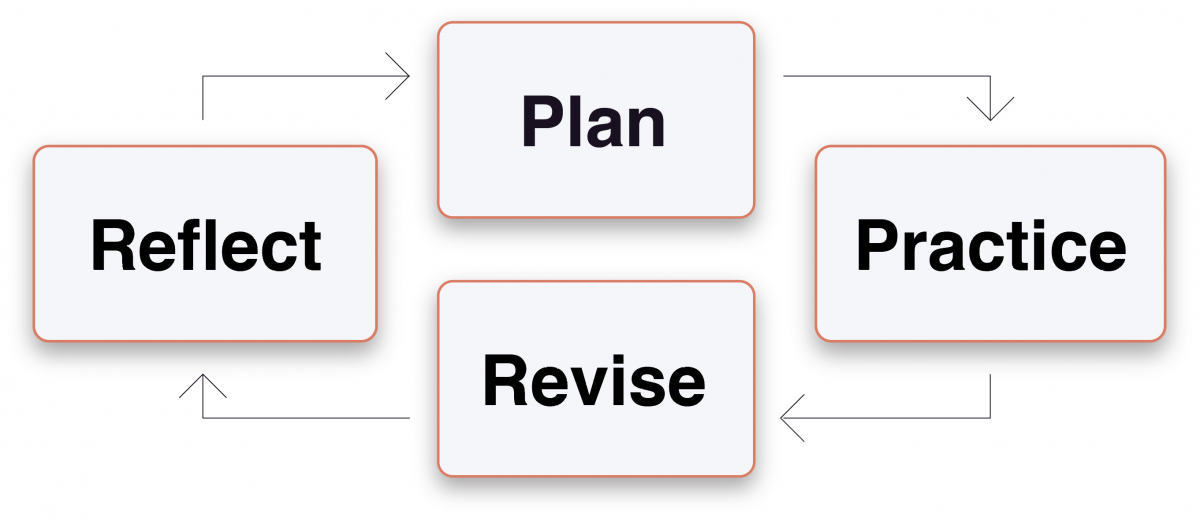
Here's a quick tour of the cycle (Figure 1) before we get into specifics:
Plan: A mindful writer will take time at the beginning of a writing task to assess the task and set goals. In the planning stage, you'll consider what your audience wants from you as a writer. You'll collect and study examples of the thing you're supposed to write. You will decide when you'll write and how you'll discipline yourself write.
Practice: In the practice stage, you come up with ideas, write out a draft using various rhetorical strategies appropriate for your context, and ask for feedback from people whose judgment you trust. I know we often call this stage "drafting," and, sure, it's that. But the word practice reminds us that you are iterating — you are beta-testing your ideas before you have to send them out into the world.
Revise: Revision happens throughout any writing process; you can't help but make little changes as you go. In the cycle of mindful writers, you receive feedback and then you make deliberate, meaningful changes to your work at all levels (from the whole argument to the puntuation) to prepare to hand it over to a teacher, editor, or some other audience.
Reflect: To develop your metacognitive abilities as a writer, you'll need to think carefully about what you've learned from the writing process, what you'll take with you to future writing tasks, and what needs to change. Without this step, you can't take control of your writing.
OK, now that we've set up the global picture of writing processes, I'm going to go straight for the advice. In the next four sections, you'll find suggestions for each step in the cycle of mindful writers. This content can feel a bit list-y, but I've designed it that way to serve as a reference to help you build your metacognitive abiltities at each stage of the writing process. Dive in and out of this material as necessary.
3.3 Plan
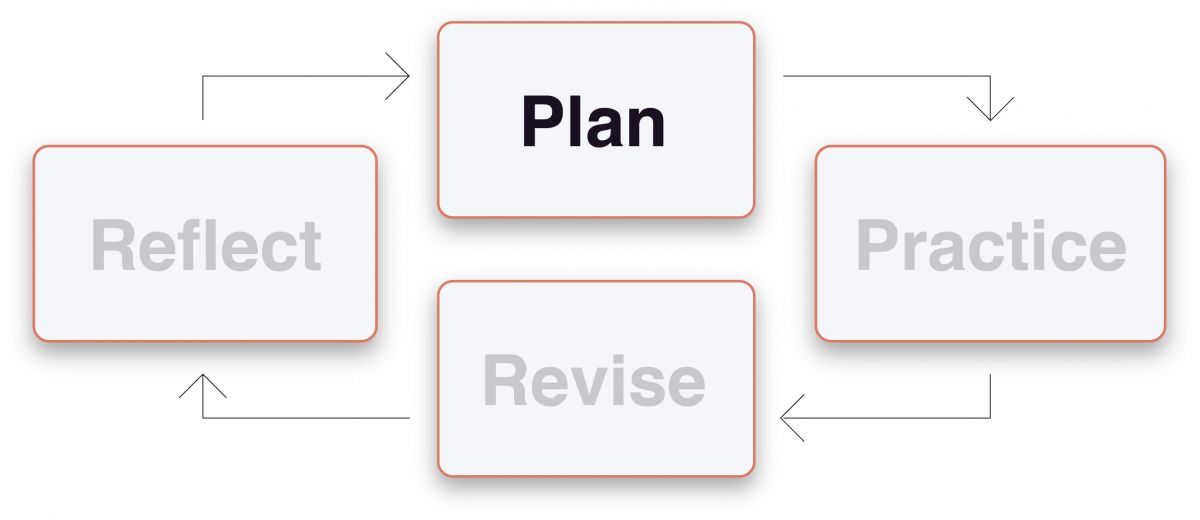
Remember that in the planning stage, we (a) assess the task and (b) set goals.
Assess the Task
Any time you set out to solve a problem or complete a task, you want to step back and look at what needs to be done and make some plans.
 Which one would you want for a bike shelter? It helps to research the possibilities and make a plan before starting a big project. Photo by Kon Karampelas on Unsplash
Which one would you want for a bike shelter? It helps to research the possibilities and make a plan before starting a big project. Photo by Kon Karampelas on UnsplashOne time my wife asked me to build a shelter in our back yard for our bikes. I'd never built one. So I watched a few videos on YouTube, talked to some neighbors, and went around my block taking pictures of other people's shelters to catch the vision. My planning made the task easier when I finally bought lumber and started hammering it together. As a mindful writer, you should take time to plan out your project before sitting down to write.
Read the assignment carefully. If you've been given an assignment sheet, read it. Notice key terms for what you're being asked to do (like analyze or argue). If your assignment came with due dates (introduction, first draft), put those dates in your phone. If your instructor gave you a rubric or other evaluative criteria, review it.
Recall what you already know about this kind of writing (prior knowledge). Ask yourself the following questions:
- How is this assignment like those I've completed before?
- How is it different?
- Which writing experiences can I draw from for this new assignment?
Analyze the genre. This is an important term that you learned from last chapter (yay, prior knowledge!). From the perspective of rhetoric, genres are more than just forms or categories of writing (e.g., romance novels). Genres are semi-formal but adaptive text types that respond to a variety of social needs. In the social sciences, we use a variety of genres to make knowledge: genres like literature reviews, research articles, grant proposals, oral presentations, or email queries. To analyze a genre, try these three steps:
- Gather examples, either from your teacher or from online (from professional sources) — it's good to have several quite different examples to show how genres vary, and it's even useful to have bad examples;
- Analyze the rhetorical situation of the genre: Who writes this thing? Who reads it? What kind of problem does it solve? What is its purpose?; and
- Analyze the writing strategies you see in the examples: How is this genre organized, usually? What kind of style or argument or document design or evidence do I detect across examples?
Assess your own rhetorical situation.
- Who is my audience?
- What do I know about them?
- What are their values, assumptions, or expertise as a discourse community (like economists or psychologists)?
- What do they want from me?
- How should I think about them, construct and invent them, as I write?
- What is my role as writer?
- What do I want my audience to feel, think, or do as a result of reading what I write?
Anticipate the value of the task.
- What am I going to learn from this project?
- What skills will it teach me?
- How will it help me do the stuff I want to do in the future?
- How will I make personal connections to this writing task so that I won't be bored or discouraged?
Set Goals
Decide what you want your paper to look like. Now that you've reviewed some examples, both good and bad (I hope), describe the kind of paper you want to write:
"In my paper, I want to do X, Y, and Z because my audience . . ."
Such goals are called product goals, and they help you anticipate a successful paper.
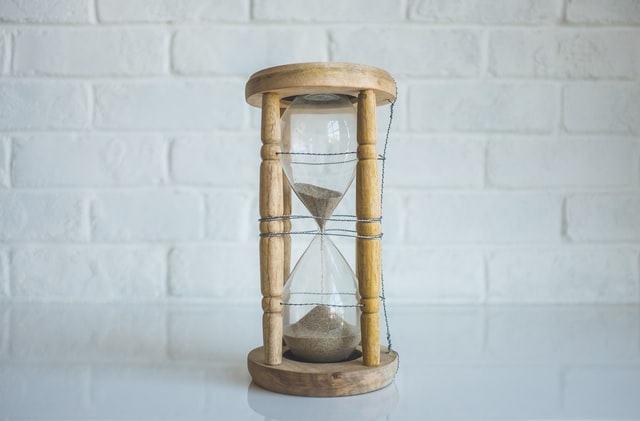 Writing for just 15 mintues a day can make a significant dent in your paper. Photo by NeONBRAND on Unsplash
Writing for just 15 mintues a day can make a significant dent in your paper. Photo by NeONBRAND on UnsplashSet goals about when and where you'll write. Get out your phone, and plan some writing times. Block out time each day to write or even just think about your project. Even if it's for only fifteen minutes. Write every day. Write every day so that when you get stuck, you won't need to worry as much about a looming due date. Choose your writing spot carefully. Find a quiet, comfy place with few distractions.
Commit to distraction-free writing. I know we're crazy about our phones and we can't live without them. FOMO is real. So are the bad consequences of CPA — continuous partial attention. Commit fully to the writer's life and shut off your phone, close all windows not related to your work, and disable all notifications. Get into deep focus mode, and the writing will be easier.
Reward yourself. If you've had a good writing day, go get yourself something sweet or savory. Or go watch an episode of that show you've been bingeing.
Set goals to share your work with others. Set a goal to share your work with a class member, a writing tutor (in the Writing Center), or a trusted friend or family member. Talk, annoyingly, about your project with anyone who will listen.
3.4 Practice
A few years ago, a friend of mine invited me to his wedding reception. In the middle of the meal, he stood up and started making a speech — standard sappy stuff. A few minutes into it and without warning, he pointed to me and said, "And now I'd like my friend Brian to come up and share a few words about our friendship!"
 Is anything as awkward as an impromptu wedding speech? Photo by Inna Lesyk on Unsplash
Is anything as awkward as an impromptu wedding speech? Photo by Inna Lesyk on UnsplashI stood up with icy fear in my veins. My mind folded up on itself like a camp chair. He gave me the microphone and I turned and looked at everyone, sitting there picking at cheesecake, and wanted to crawl into the center of the earth. I belched out a few disconnected thoughts and sat down in disgrace.
Anyway, enough about the worst day of my life. Let's imagine, instead, that I knew ahead of time that my friend would call on me to speak. I followed the advice in the last section and studied the genre of wedding toasts (YouTube, of course, has good and bad ones). And then, long before the blessed day was near, and because you shouldn't procrastinate a wedding toast, I started building the content of the speech. How should I do it?
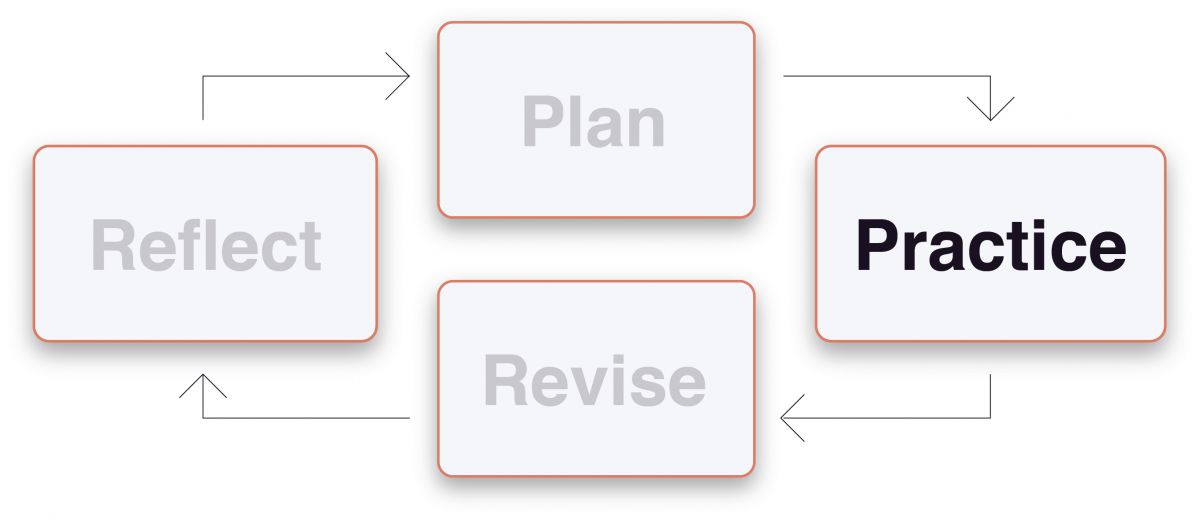
You're put in a similar position every time you are assigned to write. But unlike in my speech fiasco, you want to give yourself time to generate ideas. Once you've done your planning (assess the task, set goals), you need to generate content in a process we often call "prewriting" or "invention." That's what this section is about. I've called it the practice stage because in this stage you can experiement with your content using invention strategies and get feedback through peer review before completing the project. Again, I've given you a list of strategies and quesitons you can ask yourself as a writer.
Invention Strategies
Self-exploration. If you have flexibility on the topic, ask yourself (and answer in writing),
- What interests me?
- What do I care about?
- What's been on my mind?
- What am I curious about?
- What do I want to know more about?
- What is my "what if"?
- What do I want to study in grad school?
- What do I want to pursue as a career?
Inquiry. Ask questions. If you have a vague sense of a topic, jump on Google and read anything you can find. Consult Wikipedia. Go to the library and find a book and read it (or at least "around" in it). Find key terms or authorities from an informal search. Talk to experts about your topic. Use Google Scholar or academic databases to review expert research in social science. Review data from published experiments, surveys, or interviews; maybe you can do your own surveys or interviews.
Form a hypothesis about your topic, like "I think X influences Y, but I'm not sure" or "I think X is the case, but I'm not sure" or "I think X would be a solution to Y, but I'm not sure." It's so important to begin a writing task with questions and not answers; don't do research merely to support your preconceptions. (In future chapters, you'll learn more about the research process.)
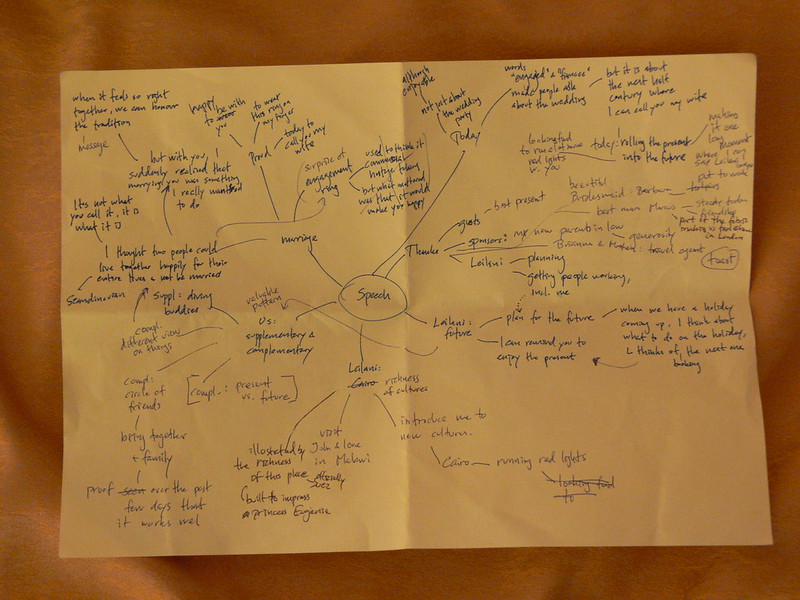 An unstructured draft of someone's wedding speech—I wish I'd had time to do this. Photo by Lars Plougman on Flickr
An unstructured draft of someone's wedding speech—I wish I'd had time to do this. Photo by Lars Plougman on FlickrUnstructured drafting. Some invention activities invite you to write without thinking much about where you're going. Unstructured invention activities can help you put ideas into sentences to explore what you're thinking. Make lists, draw pictures, make clusters (by writing your topic in the middle of a page and then branching out from there with subtopics/issues). Try freewriting: Just start writing about your topic without stopping, even if you feel like your ideas are bad. Don't stop until your fingers fall off.
Structured drafting. For those of you less inclined to the free association of unstructured drafting, you can try the structured kind. Use the journalist's questions: who, what, when, where, why, and how. Think about your topic in categories: history, consequence, law, authority, value, location, cost, etc.
Outlining. I know this sounds high school-y, but research shows that it's effective for early drafting. Additional research suggests, though, that outlining works best if you've brainstormed ideas first. So, then, here's an order for outlining:
- Brainstorm by writing a list of concepts or ideas or questions or key terms or topics,
- Organize the list into concept clusters related by theme, and then
- Make an outline of your paper by mapping out these clusters into a sequence.
Write an outline for your project, even if you're not sure you'll keep it. Anticipate how long each section will be, even if you're not sure. Write the number 1 and then write a key term or phrase about what you'll do first, and so on. Use subordination — that's when you tab over for subtopics, like this:
- Operant conditioning
- History: Thorndike, Skinner
- Reinforcement and punishment
- Positive and negative reinforcement
- Positive and negative punishment
- Classical conditioning . . .
Outlining is a helpful way to find what will become the subheads of your paper. If you're far enough in your inquiry process to know what you want to talk about, you can outline nearly every paragraph of your paper before you write it. I've found it useful to outline a text and then write underneath the subcategories the names of sources I've found that will fit in that subcategory.
Genre drafting. From my YouTube research on wedding toasts, I notice that many of them begin with a joke—sometimes a wicked-cruel but still funny joke—and then move to nostalgia about friendship, and maybe a little proase at the end. Similarly, you can draft your paper by keeping your target genre in mind as you write, which is a particularly useful exercise when you're working on a big research project.
Genres are blueprints for social behavior. If you're writing a research project that begins with an introduction laying out previous reserach, then start there. Often in social science writing, there is a "methods" section and/or a "results" section. Use these sections as guides for your drafting (but make sure the genre you're writing fots your instructor's assignment!).
Audience drafting. Related to genre drafting, audience drafting means only this: Think about your audience as you write. Remember their concerns, what they know and don't know, what they need from you to understand what you're trying to say. If your audience is non-specialist — if, for example, you're writing about social science research to the public — translate your specialist knowledge into clear, accessible language. Define your terms. Make reader-friendly moves by providing clear transitions. Help them understand why your work is important.
Ignore sentence-level issues. It's hard to ignore errors and clumsy sentences as we draft, but I'd urge you to write as swiftly as you can at first and ignore sentence-level issues. There's no use polishing up a draft that you plan to revise after receiving feedback. Turn off the grumpy editor who wants to tell you you don't know enough, your writing isn't working, you have to make things perfect. Everyone is entitled to a lousy first draft. (But no professional writer is content with a first draft!)
Write every day. I know I've already said it in the section on planning, but let me say it again. If you write every day, even if it's for just 15 minutes, you'll have more material, more ideas, more text to work with.
Peer Review
Back to my worthless wedding toast: If I'd had the time to draft a speech before giving it, I would have been wise to give a beta version to my wife or a trusted friend to see what they thought. I've been saved many times from being less effective in my writing by having someone else review it.
Remember that writing is a social activity, a collaborative work of imagination. Plan to get feedback. Without feedback, you cannot monitor and control your writing process, the primary activity of mindful writing.
Your peer reviewers play the role of readers for your work. Review helps us become reader-centered writers rather than narcissistic writer-centered ones. It gets us out of our own heads.
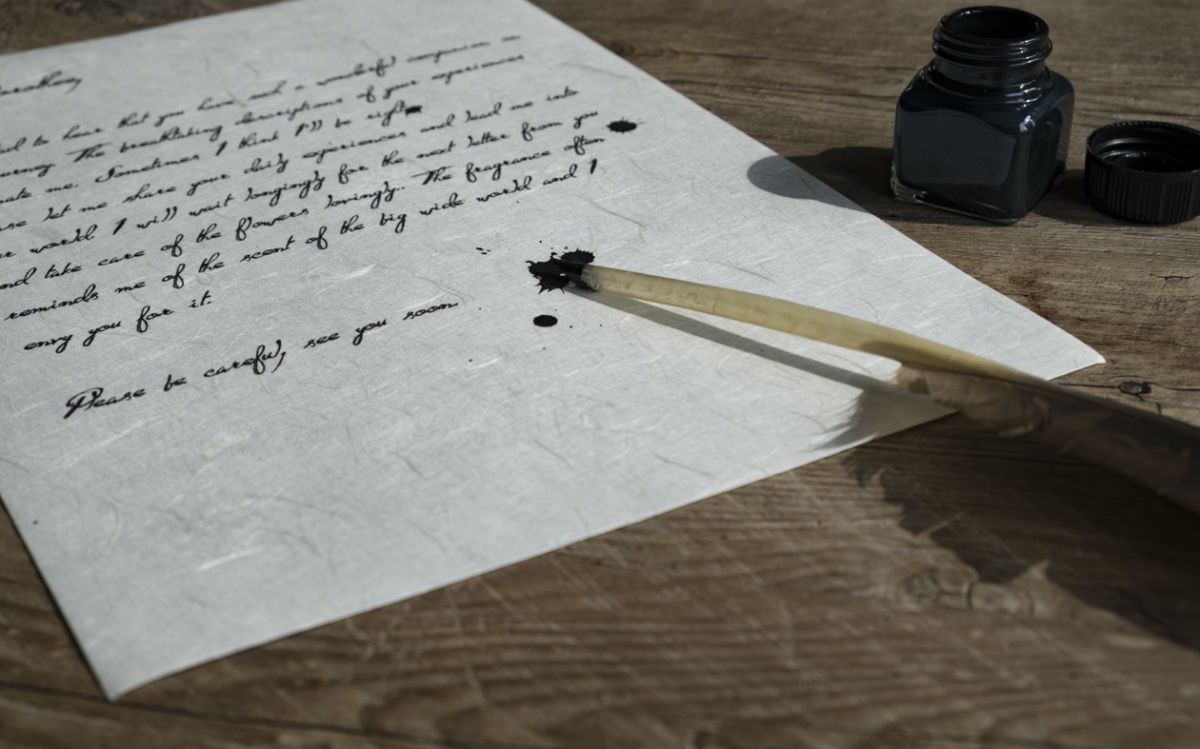 Try writing your peer reviewer a letter. (You don't have to use a feather and ink.) Photo by Wallpaper Flare.
Try writing your peer reviewer a letter. (You don't have to use a feather and ink.) Photo by Wallpaper Flare.Write your peer reviewer a letter. As you prepare for peer review, write a "Dear Reader" letter. Doesn't have to be long. At the top of your draft, write "Dear Reader," and then explain what you're trying to do and why you're trying to do it. Describe your imagined audience and their needs. Assess the draft by describing what makes it strong and where you think it's weak. Maybe give them specific tasks as readers: "I'm concerned that on p. X I lose the thread of my argument," or "I'd like you to look for places that could use more support" or "Please ignore the third section; I'm still working on getting it right" or "Please tell me where you feel most interested/bored with the paper."
Many times getting a peer review involves giving one in return. As a peer reviewer, you'll want to follow whatever protocol your instructor gives you. If you don't receive specific instructions for peer review, consider doing some of the following:
Be positive. Give the writer praise for the things you think he/she did well, and give him/her specific praise (with page numbers) describing the strengths you see in the paper.
Use shared criteria. If your instructor gave you a rubric, use its language to describe what you see in the paper. Use key terms (like argument, organization, evidence).
Be specific. Avoid vague "good job" or "it could be improved" kind of talk. Be specific about the paper's strengths and weaknesses.
Stay focused on the macro. It's easy as a reviewer to get caught up in micro (sentence-level) issues, like mistakes. Ignore them, assuming that the writer will proofread before publishing. Focus on the rhetorical situation: the genre, audience, and purpose. Is the purpose clear? Is the genre appropriate for the situation? What is the overall feel of the paper?
Ask questions. Sometimes the best feedback is a good question written in the margins: "Why is this here?" or "Where is the evidence of what you've just said?"
Respond as a reader. Trust your instincts. You can tell things about the paper based on your own experience reading it. Where did you disengage, get lost or confused, raise an eyebrow in skepticism? Are you convinced by the argument? Did the writer do something powerful with language? Tell them.
3.5 Revise
Now that you've drafted an essay and received feedback, you can revise — the third stage of our mindful writing cycle.
Since writing is hard, our natural inclination is to do less of it. When I sit down to write, I find myself shuffling papers around my desk or looking for something to eat or leaning back in my chair to look out the window. Sometimes I play Pac-Man or online 8-Ball. That's when I know I'm in full writing-avoidance mode.
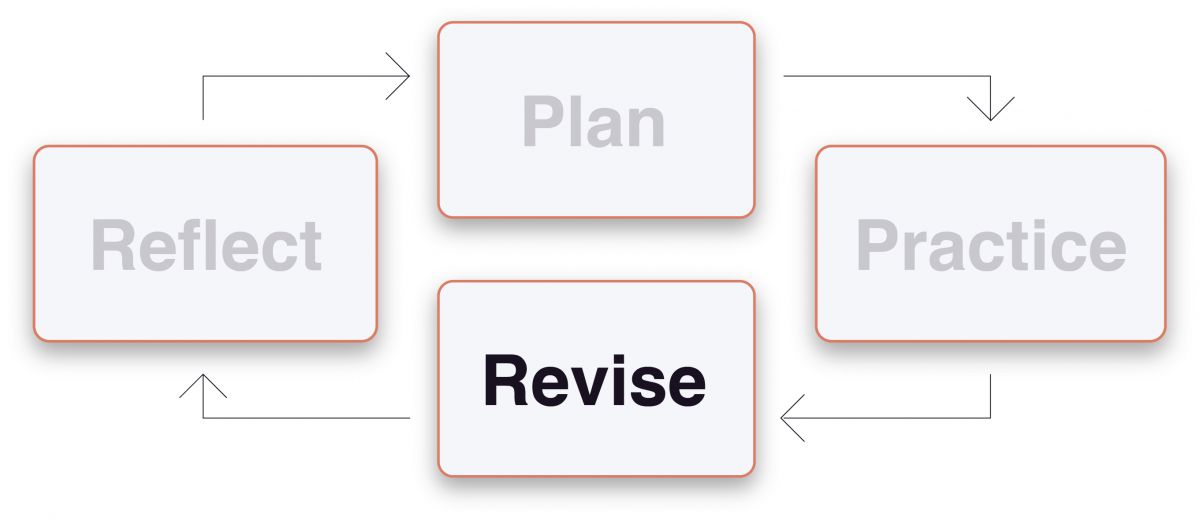
Novice writers struggle with these avoidance feelings once they have a draft written. Research shows that novice writers revise very little of their drafts, making mostly cosmetic changes while proofreading. The more successful writers are thinking about their genre, audience, and purpose in the revision process. Moving commas around will come later. Revision is the process of re-seeing your work in an effort to make it as strong and effective as possible. And yes, it can be painful as heck. Surely it will be less painful if you've given yourself time to revise and if you're writing every day. (Got the message yet? Write every day! Think of yourself as a writer. It's what you do.)
 There's just no way to rock a hospital gown. Be okay with feeling vulnerable. Photo by National Cancer Institute on Unsplash
There's just no way to rock a hospital gown. Be okay with feeling vulnerable. Photo by National Cancer Institute on UnsplashRevision is a mindset. When you give your writing to someone else, you make yourself vulnerable, like that moment when the doctor comes in and you're wearing that little sheet that's open in the back, feeling like a weirdo and waiting for the next embarrassing thing to happen. If you decide to take on a mindful learner disposition as a writer, you'll tell yourself the profound but often unspoken truth that All writers have more to learn. Even you.
In that sense, you won't feel like your writing is an embarrassment but a moment to explore your own thinking while you're saying something important. When you receive feedback, listen attentively. Don't try to defend what you've written; everyone knows it's a draft and you're entitled to write poorly in a draft. Ask good questions and take notes. Let the peer review process instruct and refine you.
With feedback in hand, you're ready to re-see your work. The mindful writer now monitors and controls the process with "user" (i.e., audience) perspective. As you review the feedback and your draft, start devising a revision plan. Your revision plan will be composed of your own sense of the draft and the feedback you received.
Because writing processes are idiosyncratic, you'll find your own path through revision. Here are some questions you might want to ask yourself as you revise:
- How can I make this text more aligned with the required genre?
- How can I help my audience get the information they need?
- How can I make more creative, innovative decisions that will engage the audience?
- Where do I risk offending or boring my audience?
- How can I make my purpose more clear?
- Considering my audience's specialized social science knowledge, what do I need to do to support the argument I'm making?
- How could I more effectively organize this draft with subheads or topic sentences?
- How will I revise my paragraphs to make them more focused on a single idea?
- Where in the draft do I feel most excited about the writing?
- Where in the draft do I feel like I'm confusing or I'm B.S.ing?
- Where can I add more style — examples, metaphors, humor, a clever turn of phrase?
- How have I established my own credibility?
Once again, stay focused at first on getting the Big Picture in place before you start revising sentences for style or error. Learn to trust your instincts. Sometimes as we read our work carefully, if we read it carefully, we have these impressions, a "felt sense," of how the writing is going. Listen to what your senses are telling you. Imagine a fellow social scientist (or whoever your audience is) reading your text. Read your text out loud to get some distance between you and it, to hear it in a new way.
When you have a draft in good shape, you may want to look at The Big Revision Checklist (Google document) as you proofread and polish. Just keep in mind that this list is incredibly thorough, so focus on the areas that you need the most.
You want your revisions to be purposeful. You want to be able to explain to someone how your revisions improve your text. That's the goal: deliberate, purposeful changes to a text to make it more rhetorically powerful.
3.6 Reflect
I've been trying to convince you in this chapter that writing is more than just doing a task. Mindful writing means developing new powers, dispositions, and habits — a new, more aware and deliberate writing Self, committed to improvement. When we write, we project an identity to our audiences; by reflecting, we construct a learning identity for ourselves.
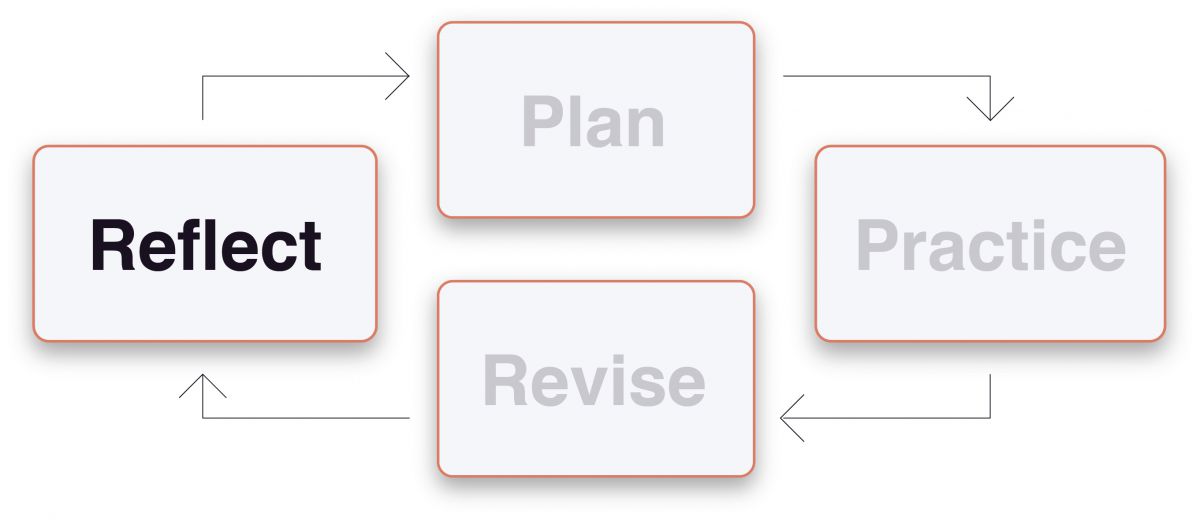
Research has demonstrated that reflective writing can help people overcome post-traumatic stress disorder, tragedy, anxiety, depression, racial prejudice, academic failures, and other ailments. In a more modest way, reflective writing can help us think through what we've accomplished when we finish tasks and how we're a different, wiser person as a result of it.
After you turn in a final draft, you can build a healthy, mindful writerly identity by spending a little time reflecting on what you've learned in the process. Ideally, your instructor will require you to do some of this reflection — either in an informal writing assignment or in class discussion — so you can make this identity construction a social experience.
I know it sounds corny, but reflection can make you a better person. When you look back at something you've accomplished with something more deliberate and mindful than relief, you develop dispositions for writing success in the future.
So: How should you reflect? You can start by answering the following questions:
Looking Back, Measuring Progress
- How did completing this writing task help me achieve outcomes A, B, C for this course?
- How do I feel about my final draft?
- What did I do well? What would I revise if I had more time?
- What did I intend to do? What did I actually do?
- What did I learn about myself as a writer?
- What can I see in the drafts as evidence of my learning? Where specifically in the drafts?
- What do I wish I'd learned but didn't?
- What writing strategies did I use to complete this paper? How well did they work for me?
- What rhetorical strategies did I use in this writing task, and why (genre, audience, purpose)?
Looking Forward, Making Connections
- What will I need to change about my strategies in the future?
- When do I think I'll write a paper like this again?
- Which writing strategies will I use in future writing tasks?
- Which rhetorical strategies will I use in future writing tasks?
- How will completing this writing task have helped me live my everyday life?
Notice how these questions invite you to think about your completed task in a variety of ways related to the course, your assessment of the final product, your perception of your own growth, and your sense of what needs to change in the future.
 Use your newfound Reflection Powers to look backward and forward at the same time. Photo by Laurenz Kleinheider on Unsplash
Use your newfound Reflection Powers to look backward and forward at the same time. Photo by Laurenz Kleinheider on UnsplashAnd now I hope you're seeing how the steps in the cycle for mindful writers are connected. There's always another writing task on the horizon. These questions prepare you to move forward by looking backward. When you start a new task, you start with the dispositions, experiences, and knowledge you already have; there's no shortcut to becoming the writer you want to become. But after each task, you can consolidate your new powers to project yourself into the next writing task, having become just a little bit better than you were before.
3.7 Collaborative Writing
We've reviewed the mindful writing process and its stages. In this last section, we're going to talk about one more important social aspect of the writing process that every advanced writing student should know: collaborative writing.
In my experience, students underestimate the amount of time they will spend as professionals — no matter the profession — working on writing tasks with others. In a 2015 study on writing in the workplace, University of Wisconsin literacy expert Deborah Brandt discovered that most workplace writing is co-authored, as is most published scholarship in the sciences. Does that surprise you? Considering some of your previous experiences with collaborative writing, it might do more than surprise you—it might dismay you.
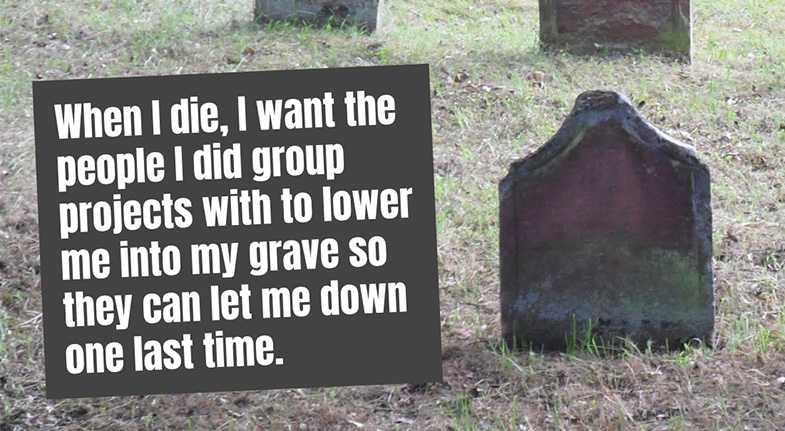 A Common Sentiment about Group Writing. Photo on Creative Commons.
A Common Sentiment about Group Writing. Photo on Creative Commons.Why Group Work Fails to Spark Joy
I don't want to start on a negative note here, but let's acknowledge that not everyone has a good experience working on projects with others.
Sometimes we just don't get along. A common group anguish is with the freeloader, the group member who shows up to maybe one meeting, disappears, won't respond to emails or texts, maybe shows up on the day of the group presentation to stumble through, and then takes credit for the final project. We all know this person. This person is on the Naughty List. Don't be that person.
Don't be the controller, either. That's the person who, from the beginning, and perhaps because this person is anxious the rest of you won't pull your load, takes over the whole project and starts calling the shots. There's also the pleaser, who just wants to do what everyone else wants to do and has no original ideas or suppresses his or her own valuable alternative ideas.
Much like what Leo Tolstoy says about families in the first line of the novel Anna Karenina, there are many ways unhappy groups are unhappy. Who can blame students for wanting to avoid them?
In spite of the somewhat popular but vague negative feeling about group projects, my guess is that many of you have had positive experiences working in groups. And it turns out that all the research on collaborative learning has revealed that students learn significantly from group projects. The Association of American Colleges and Universities labels collaborative work a "high-impact practice" because of what students get from it. When you have to work together, especially with folks you wouldn't normally associate with, you have to listen to others, learn from them, and test your ideas against theirs, which can be a refining process. You'll find out that — imagine! — not everyone thinks the way you do, and we're better off when we combine our ideas with the ideas of others.
What do you do if you've been assigned a group writing project? How do you ensure that the end product is something you can be proud of and that the process you take to get there is productive?
 Your writing group could be this happy if you follow the advice in this chapter. Photo by Jud Mackrill on Unsplash
Your writing group could be this happy if you follow the advice in this chapter. Photo by Jud Mackrill on UnsplashGetting Started
Get to know each other. If your instructor has assigned you a group and you don't know the other members well, take some time to get to know one another. Cover the standard ground about where you're from, what you're into, and what you want to do later in life.
Set up an easy communication system. Swap contact information. Group text messages work best for most people. Talk about how you're going to use a synchronous online system for collaboration. Google Docs works so much better than trying to pass Word documents back and forth because you can edit documents simultaneously and the changes are automatically saved. Review your schedules with each other so you'll know when you might be able to meet.
Discuss past group work. Share with each other an experience or two about both successful and unsuccessful collaborative projects you've been in before. Talk specifically about what made a project work, or not. Share your concerns, if you have any, about group work. Talk about what you hope to get out of this project.
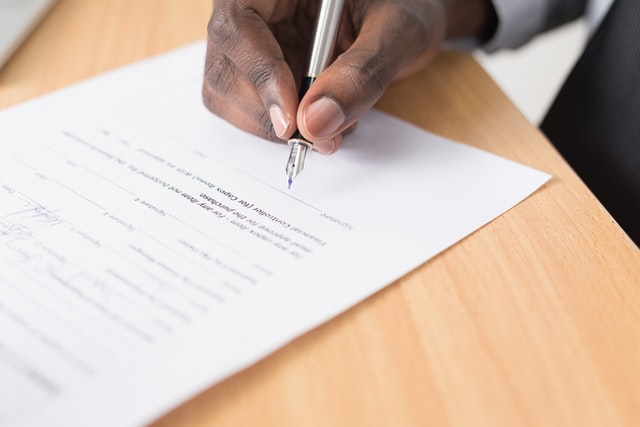 A Group Contract can actually help set expectations for your project. Photo by Cytonn Photography on Unsplash
A Group Contract can actually help set expectations for your project. Photo by Cytonn Photography on UnsplashDraft a Group Contract. If your group is up for it, you might want to draft a "Group Contract" that each person agrees to, with statements like, "I will come to all our group meetings and stay on task," "I will be timely in my communication with members of my group," "If I miss a meeting or class period, I will contact all my group members and make up for what I've missed," and so on.
Assess the task and set goals. Review together the assignment you've been given. Review whatever assignment sheets, due dates, or rubrics you've received. Break down the task into parts: What needs to happen first, second, third? Decide on a timeline for when you want to have pieces of the project completed.
Assign group roles. The most productive groups I've been in have a very clear distribution of labor. Each of us knows what our assignment is. Everyone has a task. The easiest way to divide up a group writing task is to assign each segment of the genre you're writing (introduction, literature review, etc.). However, that method might lead to a fragmented text. Instead, you may want to consider assigning roles related to project management: timekeeper, notetaker, editor, communication director, reviewer, facilitator, etc.
Get to Work
Stay in touch. I know that some of you would rather start on a task and be left alone for a while, but in my experience, the stronger groups overshare with each other. I mean that they talk frequently, even if only for a few moments on a group text about this or that issue. It's easier to solve problems early when the entire group is open to this kind of self-correcting chatter. It would be even better if you could meet together face to face with open laptops and work together at the same time, talking and then writing and then talking and then writing.
 Value everyone's input and resolve differences amicably. Photo by Mark Adrian on Unsplash
Value everyone's input and resolve differences amicably. Photo by Mark Adrian on UnsplashCompromise. I've had more than one experience writing in groups when another group member has cut some of my material from the final product. Though I've never felt that the cut material was absolutely essential to the project, I have felt that my work was undervalued or dismissed or misunderstood. In those instances, I've had to move forward with the new changes knowing that each member will have to compromise material for the good of the project. If you feel like part of what you've produced is essential to the project, discuss the issue with all your group members.
Resolve differences. Sometimes groups don't get along. If so, don't assume your group is dysfunctional. It's a people thing to have static in close quarters. Some of these problems will be alleviated significantly with the kind of work I recommended in the last section. Before you go to the teacher, try to work out the differences together — all of you together (i.e., try to keep from pairing off in disagreement). Listen carefully to someone else's concerns. If things get unmanageable, visit with your instructor.
Write. Just throwing in my mantra again: Write, and write as much as possible. As a group member, don't wait till right before due dates to get things done. Get your work finished so you can then turn your attention to the work of others in the group. Invite other group members to read your work and offer feedback.
All-in on finishing touches. Though you may select someone to be the final editor or proofreader, plan for each group member to review the final product before turning it in. You want every member to sign off on the final project so the responsibility is shared.
 As part of your afterparty, take time to reflect on how it went. Photo by Maxime Bhm on Unsplash
As part of your afterparty, take time to reflect on how it went. Photo by Maxime Bhm on UnsplashThe Afterparty
Reflect. Once you've turned in your project, take a moment and think about what you've learned — about writing, about yourself as a writer, about group projects, about the topic you wrote about. What went well? If you could go back to the beginning, what would you change about the way your group handled the project? What did you learn from the group project that you likely would not have learned working on your own? What will you do differently when you need to work in a group again?
Assess. With any luck, your instructor will ask each group member to fill out a peer evaluation form to describe and assess the various efforts of the other group members. If you're not sure your instructor has set up a system like this, go ask. On the better peer evaluation forms I've seen, the instructor asks you to rate both the quantity and quality of each group member. Final scores might depend on the way you evaluate your peers. It's hard sometimes to make such judgments on people you've worked closely with. But without this accountability, some people will do more work than others.
In conclusion, I hope you can have more positive experiences working on collaborative writing tasks. Team projects and collaborative writing are central to the work of many situations you'll find yourself in at college and in your career. If you can learn to work effectively with groups, you'll have great success, no matter what you do.
******
And if you take only one thing away from this entire chapter, I hope I've at least convinced you to become a mindful writer who thinks not only about what you write but how you write—so that the next time you face a writing task, you're even more competent and confident than before.